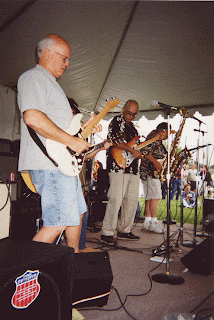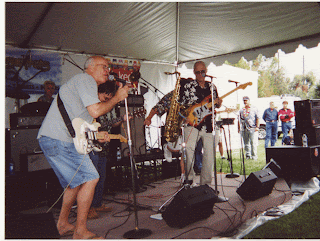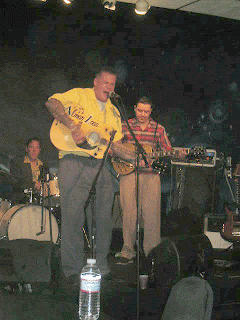Pipeline by the Chantays was and is my favorite surf rock instrumental. It has no rivals. When I finally was able to meet Brian Carmen and Bob Spikard, who composed it as 11th graders, it was a thrill. Wipe-Out by the second Surfaris http://thesurfaris.com/ was a major hit twice during the 1960s and maybe the Beach Boys music prevented it from doing even better!
Years went by that I seldom heard surf music on the radio. I started haunting second hand stores, garage sales, and record swap meets to quench or satiate my rock instrumental hunger; pop music vocals were leaving me cold as early as 1962. 40 years later I managed to see a few of the men that were still boys when I first heard them. At the Gene Autry Museum the Surfaris, with the late Jim Pash, played and I was there. Paul Johnson http://www.pjmoto.com/, a founder of the surfing rock instrumental sound, also performed as did the Lively Ones, and Eliminators and, of course, Dick Dale. Paul Johnson's band, The Bel-Aires also spawned the Challengers and Eddie and the Showmen https://en.wikipedia.org/wiki/Eddie_%26_the_Showmen. The Challengers outlived most of their contemporaries with the late Richard Delvy http://www.discogs.com/artist/467531-Richard-Delvy as it's drummer and leader.
Why did the surfing music cease to be played where it was born? The answers are not easy nor terribly difficult to answer. We, in the States, has post-national groups like our invisible government The Council on Foreign Relations http://www.cfr.org/ that is very much tied to England and its Plutarch. Then the 'great', tax-exempt foundations, as Norman Dodd, exposed, also determine much that becomes the national or rather, international memory of Americans away from our unique culture and its value. To understand music by simply looking into books on it, misses much. In 1962 true conservative Dan Smoot and his Dan Smoot Report https://www.youtube.com/watch?v=1NvLsKeOlmY are still essential readings or seeing. What a man! http://www.freerepublic.com/focus/f-news/953848/posts wrote the seminal book on this eastern establishment called The Invisible Government https://www.youtube.com/watch?v=FQhnXm710ps, and even Joseph McCarthy began to shine his probing light towards the eastern establishment elites too and became a #1 target!
Instrumental music, it should be recalled has an emphasis on the MENTAL. It is more like radio. A theater of the mind in which everyone interprets the sounds differently, so a controlling consensus is much more difficult to attain. Vocals, I believe, are akin to television. Explicit. Leaving less to individual imagination. With the influx of UK acts like The Beatles, whom I still like, Mi6 and its counterparts in the states, saw new opportunities for control and, in my opinion, debauchery through the still young, rock and roll. This may have been why The Shadows of England, who nearly totally instrumental, did not catch on: not the proper vehicle for use by intelligence agencies. I know they impacted as I have spoken to rock instrumentalists who got started in the 1950s or '60s, and all, without exception knew of and admired the sounds of The Shadows http://www.hank-marvin.dk/side2English.html. Led by Cliff Richard http://www.cliffrichard.org/, they were, in my opinion and many others, the best of the teen idol bands. Unlike US acts, UK backing bands also got contracts. This allowed them to earn wages even if the singer, say an Elvis, was busy making movies or in the military, as an act in their own right.
Concurrent with this music, I followed kustom car and hotrods. Read Cartoons, followed Tony Nancy, Parnelli Jones, AJ Foyt, and Mickey Thompson as well as Ed Roth, Barris custom cars, skateboarding and surfing. I knew who Miki Dora http://www.surfline.com/surfing-a-to-z/miki-dora-biography-and-photos_792/ and Corky Carroll were before I knew who Bart Star, or Rosey Grier were.
Officially
surf music is designated as a form of California folk music, according
to Brian Chidester and Domenic Priore's excellent book: Pop Surf Culture: Music, Design, Film and Fashion from the Bohemian Surf Boom,
on surfing music and surfing culture over the last 100 plus years. If
you're interested in it, it a book you cannot do without.http://www.amazon.com/product-reviews/1595800352/ref=acr_offerlistingpage_text?ie=UTF8&showViewpoints=1 I got my hardback copy of it before the price skyrocketed to over $100.00!
Here is a marvelous website (in Spanish) devoted to the rock instrumental rockers:http://salvadordominguez.blogspot.com/2012/09/el-rock-instrumental.html



























